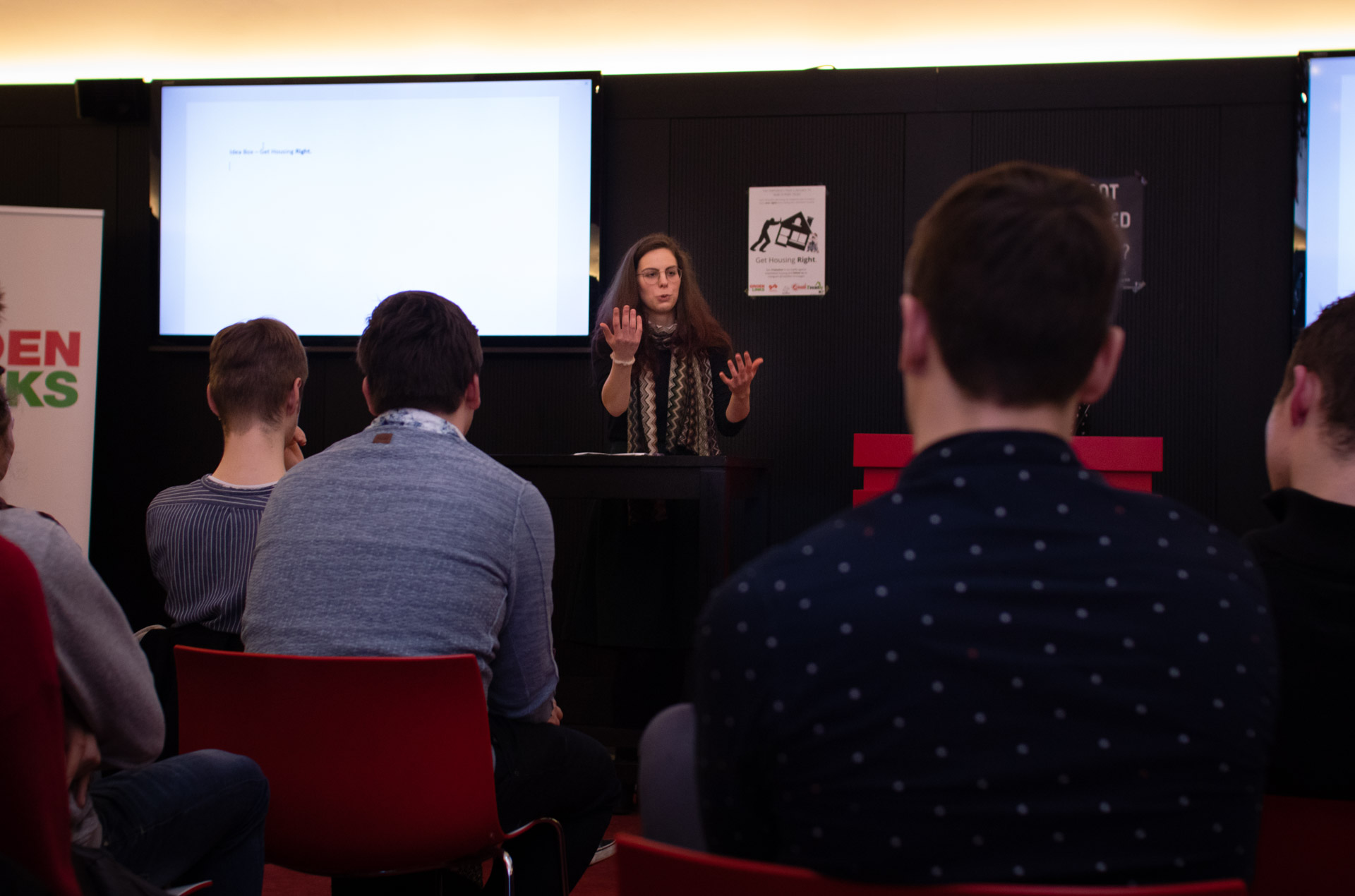Minor Rhetorics

Today, rhetoric is everywhere and persuasive speakers and writers are much in demand. Attention is scarce and to stand out in the restless and saturated (online) world, you need both a good message and the skills to sell it.
The Rhetorics Minor teaches you how to persuade responsibly in a world filled with fake news, spin doctors, and misleading advertisement. The future needs inspiring leaders equipped with the rhetorical knowledge to solve challenges and counter manipulation. After all, those not skilled in rhetoric are prone to become its victims. The Rhetorics Minor provides you with the tools to become the type of orator you aspire to be.
In this minor, you will explore rhetoric as a theory, practice, and way of life. You will learn about the rich history of the field and important theories and persuasive techniques.
The minor is practice-oriented: you immediately put into practice what you’ve learned and train essential skills like debating and improvisation to become an effective speaker. In addition, you will learn to judge other people’s attempts to persuade and manipulate you and how to counter this.
This minor is imagined by and developed with the help of students (read more in the Ukrant).
Interdisciplinary project-based teamwork
The heart of the minor consists of the Rhetoric Lab, in which you employ your rhetorical skills in an interdisciplinary team to work on a rhetorical challenge for an organisation, client, or stakeholder in or outside de university. This collaborative project will teach you to work together with students and clients from diverse backgrounds on a professional level and make a real impact in everyday society. The Rhetoric Lab will make you a persuasive, eloquent, and interdisciplinary team player ready to take on the challenges of the next decade.
Students who complete the minor
- are inspiring master rhetoricians who know and put into practice a broad arsenal of persuasive techniques
- can effectively present their position to a diverse audience
- can critically engage with persuasion in politics, media, science etc. and distinguish manipulation from persuasion
- can work in an interdisciplinary project team and use their skills to solve and meaningfully impact a rhetorical challenge in society
Read about Tycho's experience with the Rhetorics Minor
Tycho Wuestman, student IRIO, did a University Minor in Rhetorics last semester. We spoke to him about his experiences.
This time last year, you had to choose a Minor. How did you approach this and what would you recommend other students to do?
My best advice would be to just explore your options and not be afraid of choosing something that lies outside of your major programme, because you will learn a lot from that. Scrolling through the Minors website and Ocasys to see course descriptions and talking with friends who have already completed their Minor, is also something I can highly recommend. I was really able to weigh my options carefully after this.

Why did you end up choosing a University Minor?
I chose the University Minor mainly because I was interested in the topic, Rhetoric, but also because it meant I would be in a group with students from all over the university. This was indeed very interesting. It really showed me the different perspectives that other programmes offer and it created an opportunity to meet students I would not normally speak with.
What differentiates the University Minors from other Minors, like for instance the Faculty or Career Minor?
The University Minor is created so that it works for students from all faculties. In that sense it is different from the Faculty Minor because the programme is adapted to students with very different backgrounds, making it interdisciplinary and very diverse. The University Minor differs from the Career Minor in that there are practical elements, but there is also a strong focus on theory.
The University Minors offer you a chance to take a look at another academic field. What University Minor and academic field have you chosen and why?
I’ve chosen for the Rhetorics Minor. The academic field best applicable to Rhetoric would be linguistics, but the nice thing about Rhetoric is that it is useful for practically everyone. Personally, I chose the programme to understand how politicians can communicate effectively and persuasively. But the topic also offered me insight into how researchers or academics can persuasively communicate complex material to everyday folks, and it even helped me with presentations.
What lectures did you attend and what did you think of them?
The programme consisted of three courses in total. The course Rhetoric Lab spanned over the whole semester and consisted of a group project in which we helped an organization solve a communications problem. In the first block, there was the Secrets of Rhetoric course which laid the foundation of rhetorical theory and in which I delivered a speech as my final assignment. The specialization courses, Rhetoric of Politics & Media or Science Communication, built further upon Secrets and allowed for deeper insights into the role of rhetoric in either science or politics. The programme offered a lot of theoretical insights and practical skills. The professors also related the theory to common examples which really helped in understanding the material. Furthermore, the lectures tended to be very interactive and were different from the large-scale lectures I encountered in my major programme.
What did an average day during your University Minor look like?
A typical day during the Minor consisted of meeting with my project group for the Rhetoric Lab course, discussing what work needed to be done that week and dividing tasks. Depending on the day, I would go to either the lecture or seminar where materials were explained and I could ask questions. After the seminar, I would go work on my speech and do the readings for the next day.
How would you explain your University Minor in one sentence?
As a great opportunity to broaden your major programme and obtain skills outside of your regular skillset.
What is the concrete skill you will take with you to your job later?
It ranges from understanding how to reach out to companies and organizations in a proper way, to how I can effectively present and speak in front of a crowd, to how I can persuade people by adapting my language and speech to the audience, but that’s just the tip of the iceberg!
What has been your most important lesson?
Very cliché, but that words matter. Rhetoric can be found in the most mundane situations and once you become conscious of how rhetoric is put to use, it enables you to think more critically about what, and most importantly, why other people say the things they say.
Do you have any words of advice for students who want to do this Minor?
Go into it with a blank slate and don’t be afraid to speak up, you’ll get used to it very quickly.
Overview of the courses
Below you can find an overview the course units within the minor Rhetorics. The extensive course descriptions are available in Ocasys.
Rhetoric Lab
10 ECTS, Compulsory, semester 1 (a&b)
The Rhetoric Lab is the project-based core module of the Rhetorics Minor in which you employ the rhetorical skills that you acquired in Secrets of Rhetoric and your specialization course in an interdisciplinary team and a project of your own choosing. Under the supervision of mentors and instructors, you will work on a rhetorical problem or challenge for an organization, client, stakeholder or cause in or outside the university. The first part of the course focuses on team-building and setting the goals of the project. Together you will decide what problem you want to work and identify the knowledge, skills, and material you need to complete the project. Next, you will consult with the client/organization/stakeholder, execute your project and, at the end, present your suggested course of action and how this will impact society. At the end of this course, you will be able to employ your rhetorical skills in different context to make a meaningful impact in society.
Secrets of Rhetoric
10 ECTS, Compulsory, semester 1a
This course provides you with the tools, theory, and techniques to become a vir bonus dicendi peritus , or good person, speaking well. In this course, you will explore rhetoric as both a theory, practice, and way of life. You will familiarize yourself with the theory of rhetoric by learning about its rich history and important classical and modern theories and concepts. At the same time, you will immediately put into practice what you’ve learned in the tutorials, where you learn and train essential skills and attitudes to become an effective and excellent speaker. Finally, you reflect on the rhetoric’s potential for manipulation and learn to critically assess and, if needs be, unmask others’ rhetoric.
Politics and Media
10 ECTS, Choice, semester 1b
In this specialization course, you will explore the role of rhetoric and its challenges and potential in the world of politics and media. You will analyze political speeches, campaigns, advertisement as well as traditional and online journalism to deepen your understanding of the particular demands of political rhetoric in contemporary mediacracy. You will build on and expand your rhetorical know-how garnered in Secrets , and familiarize yourself with theories like (media) framing, constitutive rhetoric, and narrative story-telling. As always, you will put this knowledge in practice by developing and executing your own rhetorical project.
Science Communication
10 ECTS, Choice, semester 1b
The course examines the textual dynamics and the social and cultural consequences of rhetorics on understandings of science and broader public discussion about science. Built upon existing knowledge base of rhetorics, science, and communication, the course examines how scientists communicate the processes and findings of their work to the public and how the public engages with science through the following means/spaces:
(a) Popular Science magazines
(b) Science events (e.g., science cafes, festivals, art and science events, famelab, science shops); and,
(c) Video (e.g., documentaries, YouTube)
The aim of the course unit is to provide students with an understanding of the different forms of science communication (oral, written, visual/non-written) and the opportunity to practice those through practical work as well as the assignments. This class supports students to develop understandings about the state of the art of the field of science communication and to develop the abilities needed to communicate science effectively in a variety of real-world contexts. In the course we will examine how different audiences shape the way science is communicated and we will develop a set of best practices for effective science communication, which students will then apply in their own science communication projects.
Timetable
The timetables will be available soon.
Registration
Students have to register for the whole minor as well as for the course units of their choice within the minor via Progress in Spring. The course code is: LETMIN09
More information about the enrolment procedure.
Contact and information
For more information please contact dr. J. Olthof, Minor Coordinator. This flyer presents the Minor information in a compact overview.
Please note
This minor is an interdisciplinary project-based program imagined by students in the University Council and currently in the last stages of construction. This means that small changes may still be made to improve it. If this happens, students will be informed about this via this webpage and via Ocasys.
| Last modified: | 28 March 2025 11.27 a.m. |

